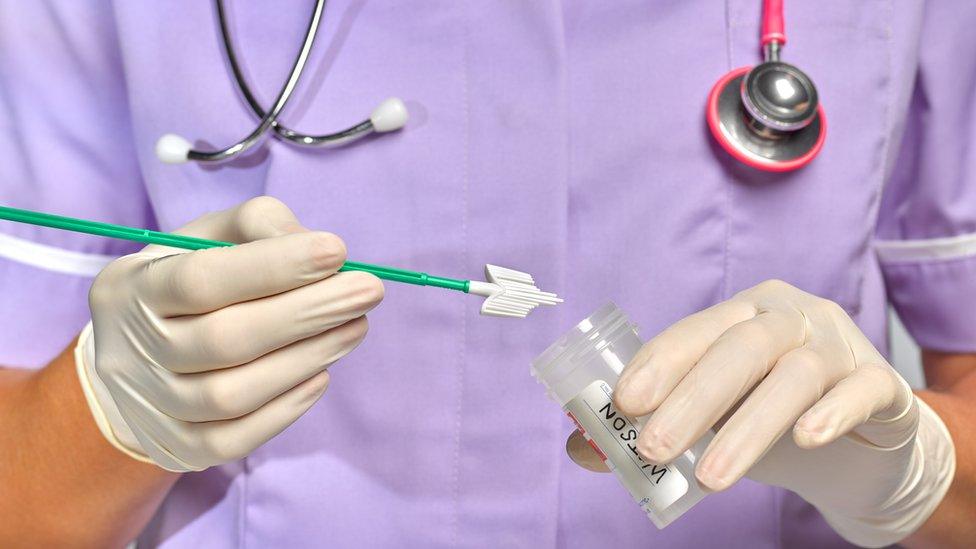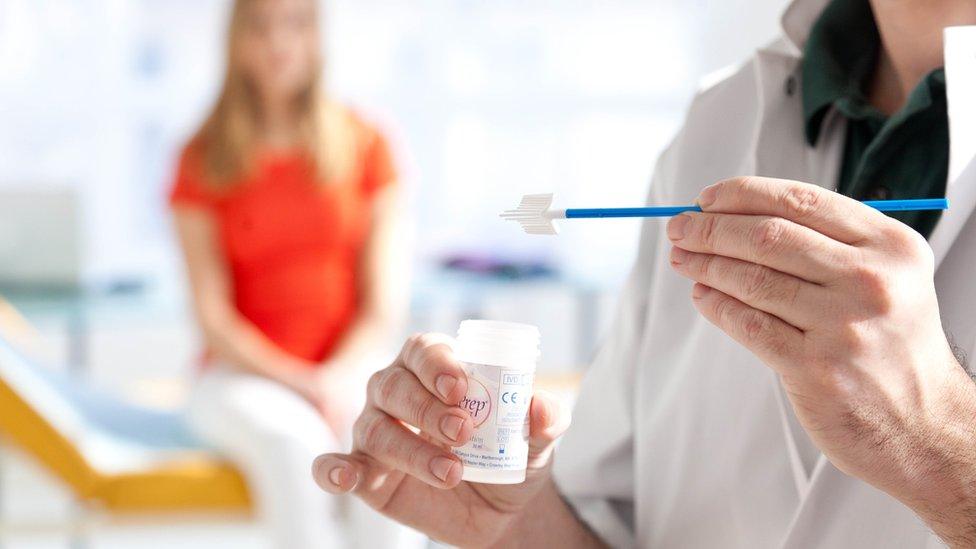Cervical screening error numbers 'may be higher'
- Published

More women who were wrongly told they did not need cervical screening may have gone on to develop cancer.
It was announced on Thursday that a woman had died from cervical cancer after being wrongly excluded from Scotland's screening programme.
She was among 434 women who had partial hysterectomies after 1997 and were told they did not need to be screened.
But the records of at least 500 women who had procedures before 1997 still need to be checked.
Public Health Minister Maree Todd told BBC Scotland: "I'm afraid we may well be looking at higher numbers."
Ms Todd said records from before 1997 were more difficult to access, but that the work should be done by the end of July
She said that "as a precaution" they were also looking at the records of every single woman who has been excluded because of a full hysterectomy - which she said was about 200,000 patients.
But she said the government "fully expected" that all of these women had been correctly excluded.
The minister said the Scottish government was first alerted to the error in March.
She said the announcement had only been made on the afternoon that the Scottish Parliament went into summer recess because there was a "laborious process of going through their records" to identify the women before it was put in the public domain.
All the women affected were contacted by letter on Tuesday of this week, she said.
A free helpline has been set up by the Jo's Cervical Cancer Trust charity, external in partnership with the NHS on 0808 802 8000.
Scottish Labour health spokeswoman Jackie Baillie said it "beggars belief" that the public had been "kept in the dark on such a serious mistake" for so long.
'Cynical abuse of power'
She added: "These women were failed for decades. The least they deserve is to have been made aware of the risk facing them as soon as it came to light.
"It is astounding to learn that throughout this Nicola Sturgeon was aware of this scandal and did not say a word.
"It is hard to see this as anything other than playing politics with people's health."
And Liberal Democrat health spokesman Alex Cole-Hamilton claimed the error had been "deliberately hidden from the public" until after last month's Scottish Parliament election.
He added: "It is a cynical abuse of power to only disclose this serious adverse event months later and on the afternoon when parliament breaks up for the summer.
"It is an insult to the women who were failed by the errors in this screening programme."
What caused the error?
The error came to light in a routine audit of a single unnamed health board.
All health boards were then examined and 434 women were found to have been wrongly excluded from screening.
Ms Todd said a "small number" of the women had subsequently developed cervical cancer.
She said the number was less than five but she could not say exactly how many because it risked identifying the women.
Most hysterectomies involve the removal of the cervix and then there is no further need for cervical cancer screening.
However, sometimes a hysterectomy is performed where part or all of the cervix remains and those women should remain on the screening programme if they are within the eligible age range.
Ms Todd told parliament it was an "extremely complex issue, spanning a number of decades and involving a variety of potential errors".
She told BBC Scotland the errors included:
Women who had gone into hospital for a total hysterectomy - removal of both the womb and cervix - but for "technical reasons" that had not been carried out. However, the NHS "coding" recorded the intended surgery.
Other issues occurred with the pathology lab finding cervical tissue which led to the presumption it was a total hysterectomy when actually there was still cervical tissue in the women.
A further issue was that the correct information was communicated to primary care but it was wrongly presumed to be a total hysterectomy as this is what the majority of procedures are.
Scottish Conservative health spokeswoman Annie Wells said it was concerning that further cases were still to be potentially identified.
She added: "SNP ministers have serious questions to answer as to how urgently they addressed this issue.
"They were first made aware of these errors in March well before Parliament shut down for the election, but only started sending out letters to women this week. That is simply not good enough.
"It is now imperative that the SNP government clearly outline every step they are taking to encourage women who are concerned about being affected to get in touch."

Have you been affected by the issues raised in this story? Email: haveyoursay@bbc.co.uk, external.
Whatsapp BBC Scotland: +44 7902 704679, external
Tweet: @BBC_HaveYourSay, external
Please read our terms & conditions and privacy policy

Related topics
- Published24 June 2021
